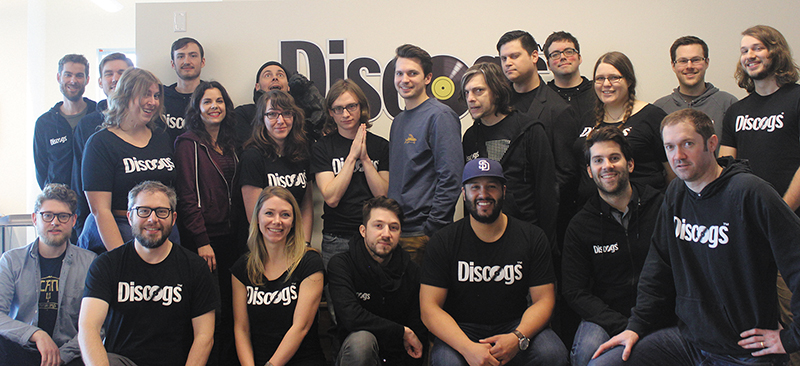
Discogs: Virtual Vinyl Meeting Place
Music Interviews
Photo Courtesy of Discogs
Over the past decade or so, varying degrees of music collectors worldwide have seemingly begun to defect from large online retailers like eBay and Amazon in favor of “smaller,” more intimate online stores. The most popular, and quite possibly the fastest-growing, is Discogs. What began for founder and CEO Kevin Lewandowski as a simple means of tracking his personal music collection has turned into arguably the most comprehensive online database of recorded music, as well as an extremely popular marketplace—which is now taking shape in a brand-new app. For those unfamiliar with discogs.com, users can browse through an immense online database of music releases to gather information, upload new releases, catalog their own collection and seek out items for purchase that may have eluded them for years. “There is so much data in there,” says Chad Dahlstrom, the company’s Chief Operating Officer. The database is so comprehensive that you can drill down to the most specific release details. “You don’t just own an Allman Brothers album,” says Dahlstrom. “You own the Polydor 1977 release from Spain.”
Lewandowski began building the first iteration of the site back in 2000. “I was looking for a site that allowed me to track my collection,” he says. “I saw a lot of user-built sites popping up at the time, like Slashdot and the Open Directory Project,” which weren’t quite what Lewandowski was looking for, so he decided to build his own site. Lewandowski would work nights and weekends building the site, which he says took about six months, then seeded it with about 250 drum and bass records from his own collection and emailed what he had built to his friends. He had no idea that his hobby would eventually grow into the behemoth that it has now become: With what was initially a simple database that Lewandowski envisioned using to track all of the electronic music he came across and the initial 250 records he uploaded to the site, almost 7 million pieces of physical media across 16 genres have been added to the discogs.com database, which currently has more individually accessible pages than Wikipedia.
Thanks to the size and depth of the database, people are able to learn about music that they may never have known about, and thanks to the marketplace, they are able to acquire it. “There is more transparency with information on pricing and availability, so you may not be able to score that rare record in a dollar bin somewhere anymore,” says Lewandowski. “On the other hand, shop owners are getting fair prices.” This is a blessing for some and a curse for others. Collectors who have become accustomed to scouring used vinyl shops and obtaining valuable items at a fraction of their going rate have begun seeing a decline in collectors’ items popping up in bargain bins, but those who haven’t before had the luxury of spending their free time indulging in record-hunting are now able to search, find and purchase hard-to-find items within minutes. Additionally, Discogs has helped bring music collecting back into the mainstream. “We helped enable a group of collectors who otherwise were seeing a decline in physical media interest,” says Dahlstrom. “In a way, I feel we helped keep the momentum up when things were looking grim.” Obviously, Dahlstrom is referring to the “dark days” of music collecting when it seemed that music was on track to go completely digital and that physical music releases were becoming obsolete. “Now that vinyl is so strong, we are seeing collectors come back and new collectors joining us every day,” says Dahlstrom.
On Feb. 29, Discogs officially released their app for iOS. Just like discogs.com, the app has been developed and will continue to evolve, based directly on the feedback from the community. “Our own product actually reviews all the feedback that comes in on the forums to build the app roadmap,” says Lewandowski. “We started with feedback from the beta release and added collection and want-list filtering, access to collection folders and a full image gallery.” Some of the other ideas that have come up are integrating discogs.com messaging, starting a submission to the database with your phone’s camera, and reverse image search for album covers and center labels. Thus far, response to the app has been largely positive. While the app is currently unavailable for Android users, individuals can visit discogs.com/app and sign up for an invitation once it does become available.
Whether you are a diehard collector or you’re just curious to see if you can finally find a copy of that hard-to-find single that you had your first grade school dance to, Discogs has undoubtedly helped revive the physical media release for music. It has helped usher in a whole new generation of collectors who, hitherto, thought that CDs were best used as coasters and didn’t even know how to play those crazy 12-inch pieces of vinyl their parents had in a dusty box in the basement. Hell, even those crazy spools of magnetic tape housed in cheap plastic have made somewhat of a resurgence and have found a comfortable marketplace on discogs.com. As for making sure you find exactly what you are looking for when you visit the site, Lewandowski sums it up nicely: “Our marketplace differs from other sites like eBay or Amazon because of the accuracy of our data,” he says. “If you order the third pressing of a Japanese import, you know you’ll be receiving that exact version, and you can’t do that on the other sites. We also have the best community out there, so the shared knowledge base on our site is unlike anything you would find on those sites.”
